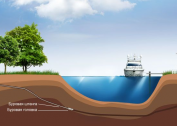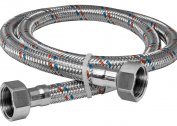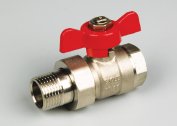In apartments of multi-storey buildings or private houses connected to the central system, moisture comes through pipelines from natural sources. The quality of water in rivers and lakes, as well as artesian wells, must comply with sanitary standards. This also applies to engineering structures, water mains and treatment plants. Impurities in wastewater should not exceed the indicators established by SanPiN, and must be treated before being discharged into the environment. All these points are spelled out in Federal Law No. 416 “On Water Supply and Sanitation”. The law also regulates the relationship between consumers and supplier organizations.
What is regulated by the Federal Law "On Water Supply and Sanitation"
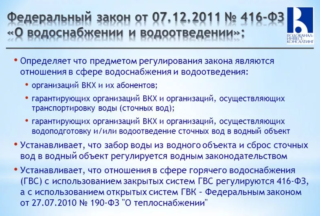 The State Duma adopted a normative act in 2011. But federal law is still valid today. In it, in order to comply with modern realities, amendments and changes are introduced. The document regulates all relations in the field of drinking water supply and sewage.
The State Duma adopted a normative act in 2011. But federal law is still valid today. In it, in order to comply with modern realities, amendments and changes are introduced. The document regulates all relations in the field of drinking water supply and sewage.
The main points that are subject to legislative regulation:
- The quality and safety of moisture supplied to consumers through cold and hot water supply networks, including the supply of water according to an open circuit from heat supply sources. This is necessary to create a favorable sanitary and epidemic situation in the country.
- Safety of sewage and industrial effluents that are discharged into water bodies.
- Rules for the supply of hot water and ensuring its quality.
- Commercial metering of drinking moisture and effluents, that is, the determination of the volumes of water supplied and received for a certain time using meters or by calculation method.
Quality and safety mean a complex of water characteristics, including physicochemical, biological, organoleptic indicators, including temperature properties.
The nuances of water supply for military and defense facilities are established by additional decrees of the government of the Russian Federation.
Key Points
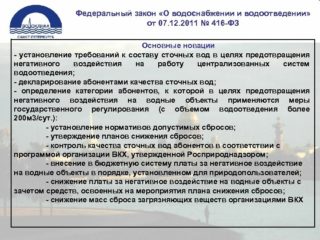 The normative legal act is intended to confirm the government policy regarding the water supply of the population and the preservation of the environmental balance in the reception of effluents. The main concepts disclosed in the law:
The normative legal act is intended to confirm the government policy regarding the water supply of the population and the preservation of the environmental balance in the reception of effluents. The main concepts disclosed in the law:
- protecting the health of Russians by protecting the quality of the supplied moisture;
- increasing the economic and energy efficiency of water and sewer networks;
- high-quality sewage treatment;
- development of new technological solutions and the introduction of modern devices;
- the availability of receipt and disposal of liquids.
The law regulates the forms and methods of managing water supply and sanitation systems, as well as relations between suppliers and consumers.
The document confirms state guarantees to the population. These include:
- providing consumers with cold and hot water, the ability to divert fecal effluents;
- accessibility of water supply resources for all citizens;
- adjustment of the effective operation of the central network supplying hot and cold water, as well as sewage systems;
- attracting investment in the industry;
- transparency of the work of organizations involved in the supply and disposal of water.
Economic factors are taken into account, as well as features of quality control and inspection of wastewater before discharge into natural sources or soil.
Last changes
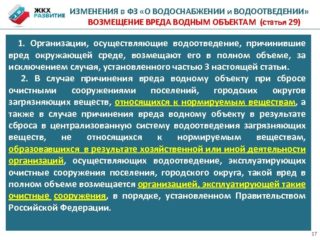 The revision of a normative act is carried out annually in accordance with changes in society, economic changes and the development of innovative technologies. Amendments adjust the sound of paragraphs of articles and add additional nuances. Some of the changes made over the past three years will be of interest to consumers:
The revision of a normative act is carried out annually in accordance with changes in society, economic changes and the development of innovative technologies. Amendments adjust the sound of paragraphs of articles and add additional nuances. Some of the changes made over the past three years will be of interest to consumers:
- Part 19 of Article 41.1 is an additional paragraph. It regulates the costs of the tenant, the reimbursement of which is possible at the expense of the state budget.
- Paragraph 15 of Article 2 states that organizations engaged in the supply and acceptance of water from consumers may also include individual entrepreneurs.
- Part 2 of Article 41.2 indicates that the subscriber must pay the debts to the economic organization before the expiration of the lease.
An interesting change appeared in part 4 of article 35 of the regulatory act. It regulates the inspection rules of organizations providing hot water, cold water and sanitation. The inclusion of verification activities in the annual plan is possible if the date of previous inspections has expired.
The most recent additions have entered into force since the beginning of 2019. Chapter 5 has been completely replaced, the topic of which was environmental protection in the field of water supply. Instead, chapter 5 (1) has been created that regulates the regulation of effluent discharge into central sewer systems. It tightens control over pollution coming from household and industrial sewers.
According to the new chapter, the obligation to develop and agree on standards for permissible discharges was removed from subscribers. Now local governments of cities and towns, where water supply and sewer networks are laid, should deal with this. At the same time, they take into account all the requirements that are prescribed in the Water Code, regulations governing the sanitary-epidemiological situation in the country and environmental protection.
Subscribers are obliged to draw up an action plan to reduce the volume of effluent if they have exceeded the standards twice or more or have allowed a single discharge, but in three times. This plan will have to be approved by local committees on environmental management and environmental safety.
In the same part of the Federal Law, subscribers indicate the need:
- to build and modernize VOCs or lease them from business organizations;
- create water recycling systems;
- introduce modern production technologies, improve the quality of services, conduct regular work to reduce the volume of pollutants in wastewater.
The penalties for violators of wastewater standards have changed. If they are exceeded twice or more times during the year, or the pollution indicators are above the norm, such violations are considered gross. The subscriber will be punished with a round sum. Fees for exceeding standards and penalties will depend on the class of waste.
Legal nuances important to water consumers
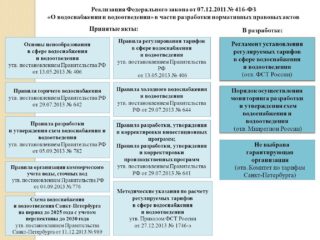 Some articles have not changed since the adoption of the law. However, flipping them is for those who are interested in getting quality water and saving on utility bills.
Some articles have not changed since the adoption of the law. However, flipping them is for those who are interested in getting quality water and saving on utility bills.
Article 18, part 13, discusses how to pay for a connection to a centralized network. The amount of expenses is calculated by the economic organization. In the event that a subscriber has requested a larger amount of water or an excess volume of effluent is required, the charge for the used water is calculated individually. Connection is not included in this amount, it is paid separately. At the same time, the costs depend on the distance to the connection area, the permissible load maximums on the water supply network.
Article 20 talks about what is subject to commercial accounting. They pay for water flows that flow to residents of multi-storey buildings or private houses connected to a centralized network, as well as drains and their subsequent purification.Payment includes transporting fluids through pipes and initial preparation for household needs.
Article 21 describes the moments when an economic organization has the right to restrict, suspend and completely shut off water supply or sewage discharges. Article 22 regulates the features of repair work at various water supply and sanitation facilities.
The problems of ensuring the quality of drinking water, the withdrawal and treatment of sewage do not lose their relevance. Their effective solution speaks of the socio-economic and technological development of the state, the reliability of the housing and communal facilities.
Legislative regulation of water supply and sanitation is necessary, since the activities of service providers in this area pose a potential danger to the life and health of citizens and the environment.
